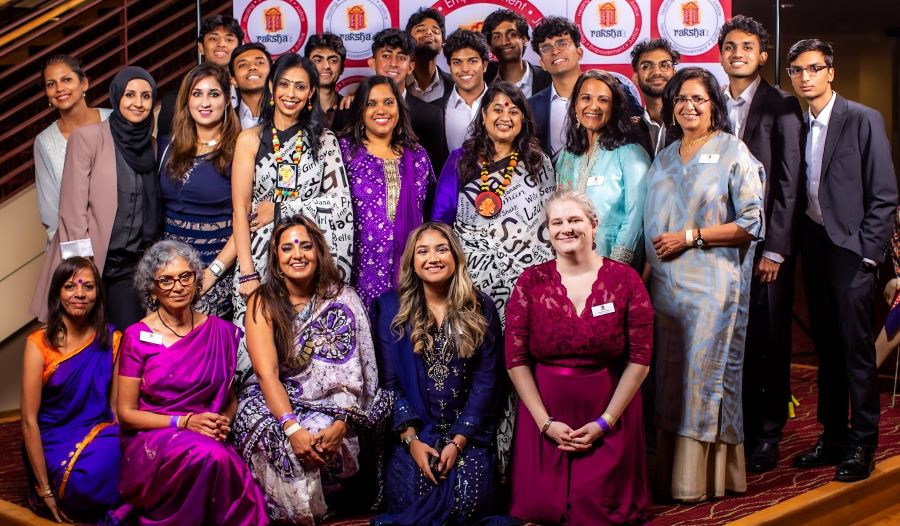BY JYOTHSNA HEGDE
Cover photo: Raksha staff, board, and friends with Penn Masala members.
Atlanta, GA, December 6, 2023: It was the summer of 1997. While most enjoyed the cooler evenings over ice creams and movies, a lady of Indian origin had been sleeping behind a dumpster of a strip mall at nightfall. Everyone around the area noticed – a few were curious, a few compassionate, some conflicted, and some, concerned. Eventually, everyone learned that she was from the state of Karnataka, India. A board member of TAMA approached then President of Nrupathunga Kannada Koota, Ramesh Bakshi. Taken aback by the information, Ramesh and his wife Vijaya Bakshi decided to meet and talk to the lady. Initially hesitant, the lady gradually opened up to the Bakshis about her ordeal. The lady, as it turned out, was well-educated. She told them that her husband had forced her to leave the house due to some internal issues and kept their two children. She had to leave her home and kids with only a suitcase of her clothes, personal items, degree certificates, passport, and jewelry, etc. With no money in hand, she had been pawning or selling part of her jewelry to survive in the hope that her husband would change his mind and come and pick her up soon. The Bakshi couple was determined to help her and soon.
But they discovered that there were no facilities within the community that would house victims of domestic abuse. The couple managed to get the lady a room at an acquaintance’s motel, gave her some money, and also had food delivered to her by some friends. The lady was ready to head back home. After raising money within their circle, the couple managed to buy her a one-way ticket back to India. Bakshis were moved by her sincerity when she returned the money they had given her. While they were able to help one person, the couple knew the issue at hand was much larger. The question that haunted them the most was: “What will happen to the next victim? What if the victim does not find compassionate helpers?”
The Bakshis had heard about Raksha, Inc., a nonprofit based in Atlanta dedicated to promoting healing, justice, and empowerment for survivors of violence within the South Asian community. They wanted to support this organization so every South Asian victim would find the Raksha (protection) they need when they need it the most. With several proficient musician friends, Ramesh Bakshi approached Aparna Bhattacharyya and Sonia Sharma of Raksha, Inc. and proposed a music concert fundraiser. And the concept blossomed into “Ek Shaam Raksha Ke Naam.” The Community Change Award presented by Raksha each year at the event is fittingly attributed to the couple.
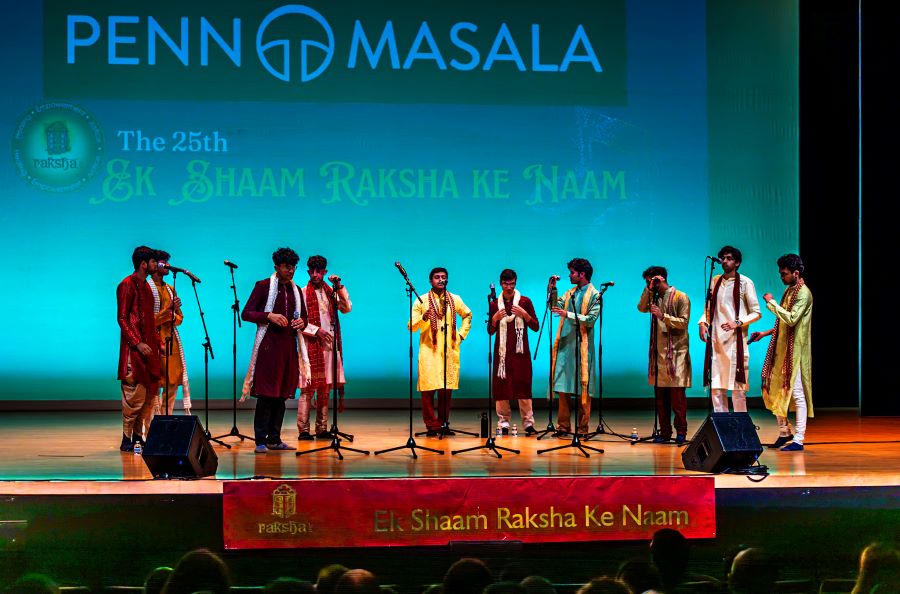
A similar untold story inspired the inception of Raksha, Inc. as well. In her high school years, founder of Raksha, Inc. Sunita Iyer witnessed the helplessness of a new bride of a family friend who came to her parents seeking help to escape an abusive marriage. The community banded together taking turns having her live with them, supporting her to obtain more education and find a job so she could leave the abusive situation and build a successful new life for herself. In 1995, as a new lawyer practicing in New York, Iyer had felt dissatisfied with her work and was trying to figure out how to best utilize her training and do something meaningful. She was reminded of the many unknown stories of struggling community members, so many facing language, financial and cultural barriers to seeking help. She knew the difference it might make to provide a bridge for the community to access mainstream services and even have services tailored. She began the legwork to create a support organization based in Atlanta to provide services statewide abuse. In developing the concept, she sought help from a childhood friend Sonia Sharma, who had the Mental Health Counselor counseling training together we plan to the initial phases of the organization. They started community outreach and recruited multilingual volunteers. And Raksha, Inc came into being.
Ek Shaam has played a key role in making the community aware of Raksha’s work and impact, also providing ways for the community to get involved and support their work. The first Ek Shaams involved community musicians, dancers, and volunteers who used their talent to support Raksha’s work.
Of the community, for the community and by the community, at 25, the annual musical fundraiser stands strong, raising awareness, recognizing bravery and advancement, and honoring remarkable strength and courage displayed by the survivors it serves. At 28, Raksha, Inc, continues its promise to provide ‘Raksha’(Protection) and a voice in the community, especially for those who cannot find it for themselves.
In a year, Raksha serves approximately 500 individuals, women, children, and men, The impact goes beyond numbers, reflected in the support that survivors receive, the validation in honoring their experiences, breaking of the isolation, and the ability to find support for the choices individuals make for their own lives.
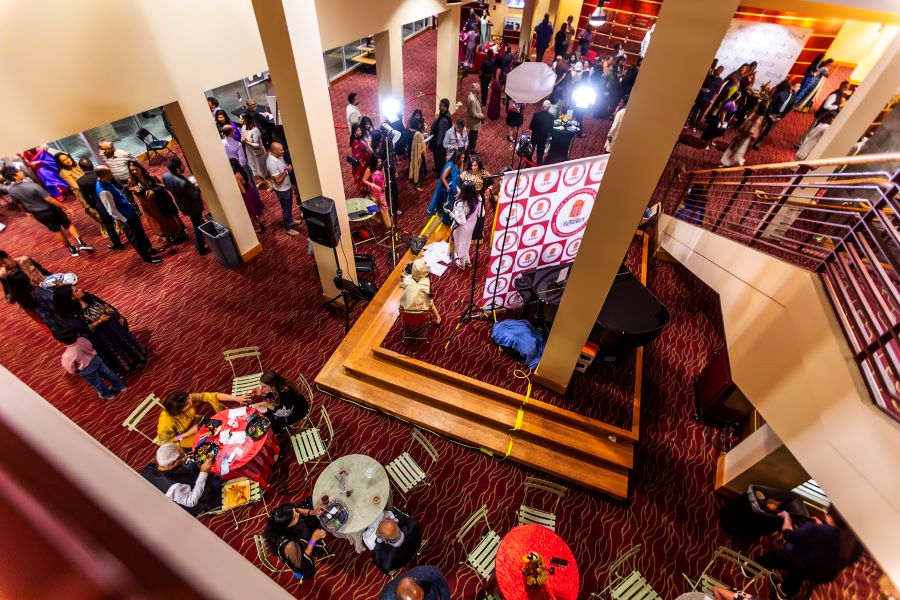
Raksha, Inc. celebrated its 25th annual fundraiser gala, “Ek Shaam Raksha Ke Naam,” on Friday, October 27th, at the Rialto Center for the Arts in Atlanta, GA. This remarkable event marked 28 years of Raksha’s unwavering commitment to serving and connecting South Asian communities.
The highlight of this year’s gala was a mesmerizing live performance by the renowned acapella group, Penn Masala. The group crooned the crowd into a trance-like rhythm with their unique fusion of South Asian Bollywood and Western music captivating the audience, leaving them yearning for more. The band performed in three sets interspersed between the other highlights in the event program.
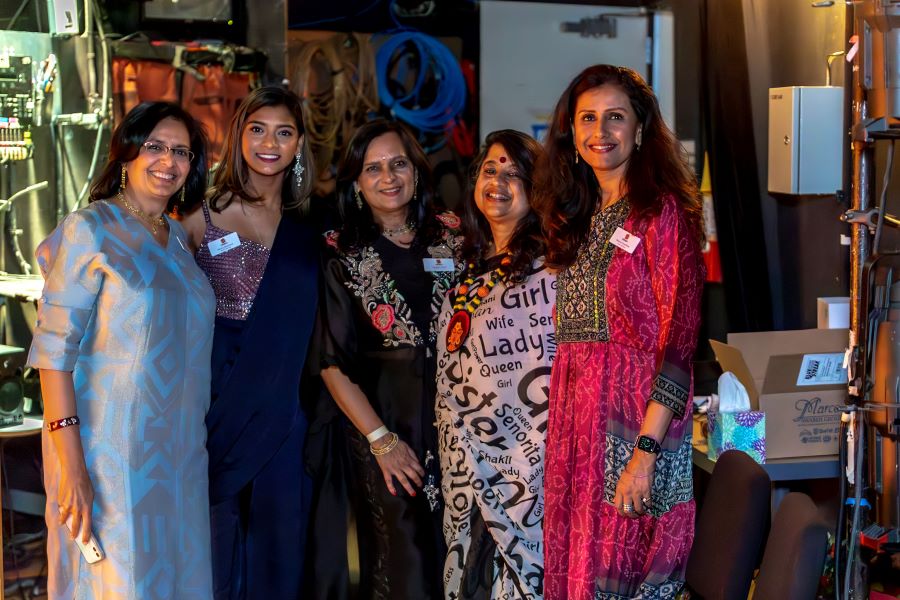
The evening commenced with a warm welcome from Raksha Board President, Nisha Kapil, and Executive Director Aparna Bhattacharyya, who took the audience on a journey down memory lane, sharing the history of Ek Shaam, which began as a musical fundraiser at Spivey Hall. Nostalgia filled the air as a slideshow of previous Ek Shaam posters graced the screen, commemorating 25 years of this cherished event.
In her welcoming message, Aparna emphasized the significance of the 2023 theme: “Raaz to Awaaz: Honoring the Journey from Silence and Secrets to Finding Our Voice.” She paid tribute to the community members who have made significant contributions to Raksha’s mission and work and initiated a round of applause for all the Ek Shaam volunteers and supporters in the audience who have been part of past events.
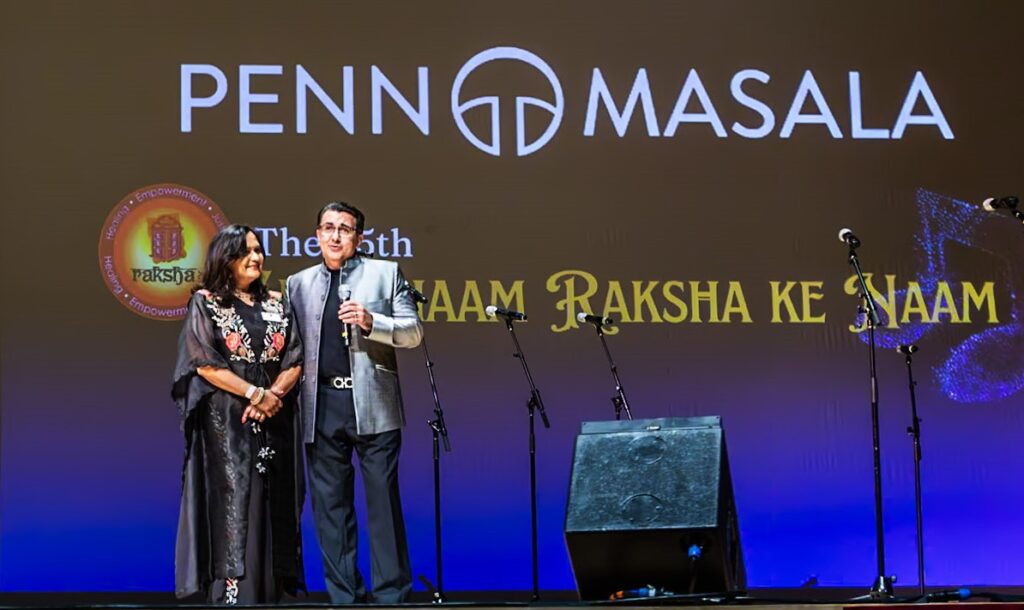
Rajen Sheth, an Ek Shaam sponsor and committee member, added a touch of humor and energy with his introductions of event supporters and sponsors, acknowledging their invaluable role in making this year’s Ek Shaam a resounding success, with a record number of sponsorships.
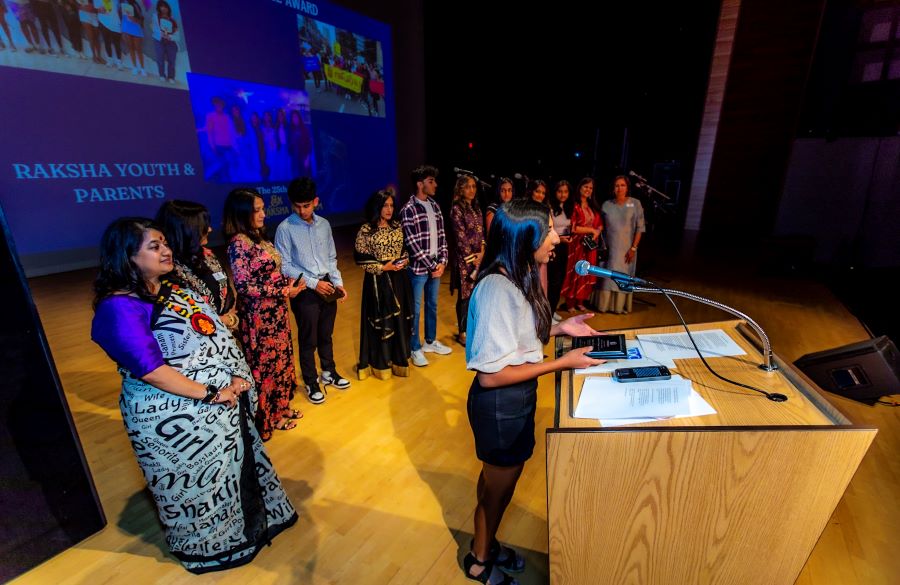
As with previous Ek Shaam events, the awards ceremony was the main highlight of the program. This year, the Seeds of Change Award was presented to the Raksha Youth Group & Parents for their enthusiastic support and dedication to Raksha’s mission. Adya and Ruchika Srinivasan, Tara and Kavita Purushothaman, Krisha and Reshma Patel, Dhruv and Sheetal Patel, Vikram and Sonali Bora accepted the award on stage.
The Ramesh and Vijaya Bakshi Community Change Award were presented to Sophia Qureshi, a journalist, storyteller, and founder and publisher of 285 South, the first news publication dedicated solely to reporting on Metro Atlanta’s immigrant and refugee communities.
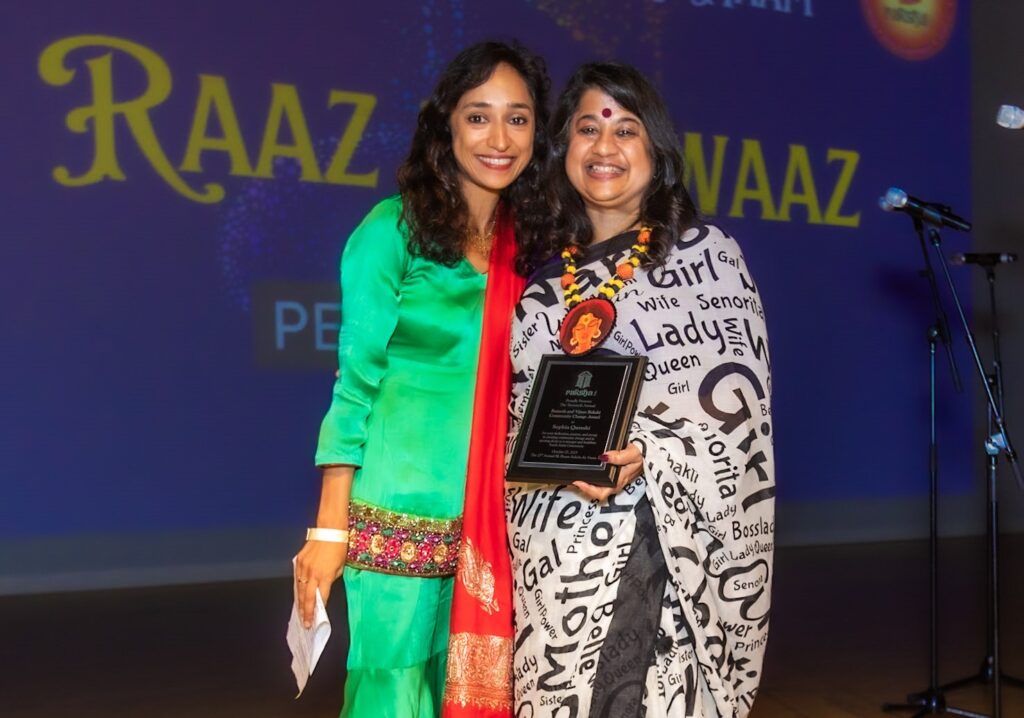
The award, Qureshi said, was particularly meaningful to her since she served as a volunteer, 25 years ago. She expressed her fondness for Raksha’s reach being pan-South Asian. With parents from Kashmir and Pakistan, she said she loved working in a place that serves people across borders from India, Bangladesh, Nepal. And most of all, she noted, “I love that Raksha was helping women see and understand their own stories and understand what they deserved, and what was not okay. I tell stories about immigrant communities…My prayer is that through stories in our understanding of each other, our actions will be directly driven by empathy and unity, instead of division and hate.”
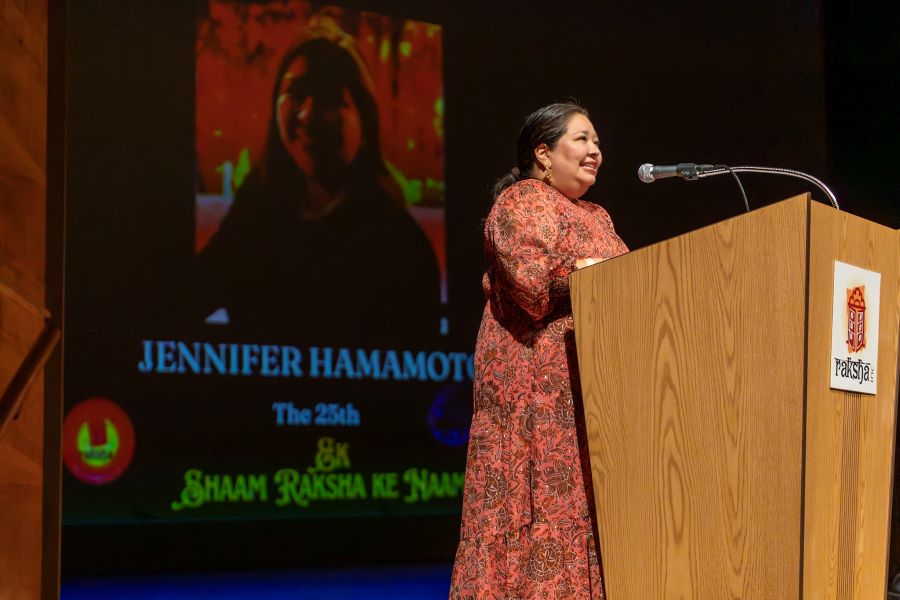
Jennifer Hamamato was the recipient of The Himmat (Courage) Award for her exemplary and long-standing work as an advocate and community leader. Jennifer serves as the managing director of Immigration Services and Victims of Violence (VOV) Lead Attorney at the Latin American Association (LAA) in Atlanta, Georgia.
“I never considered myself particularly brave, as I tend to be cautious and scared to take risks. But I read somewhere recently, that you can be hesitant or scared to do something, but pushing through your fear or hesitation to do it is what makes you brave,” Hamamato said, adding that courage is what all victims need, to ask for help. “I do this work because it is the right thing to do. And it is my vocation to make the lives of the most vulnerable and often forgotten society better and to give the voiceless a voice and feel heard and represented.”
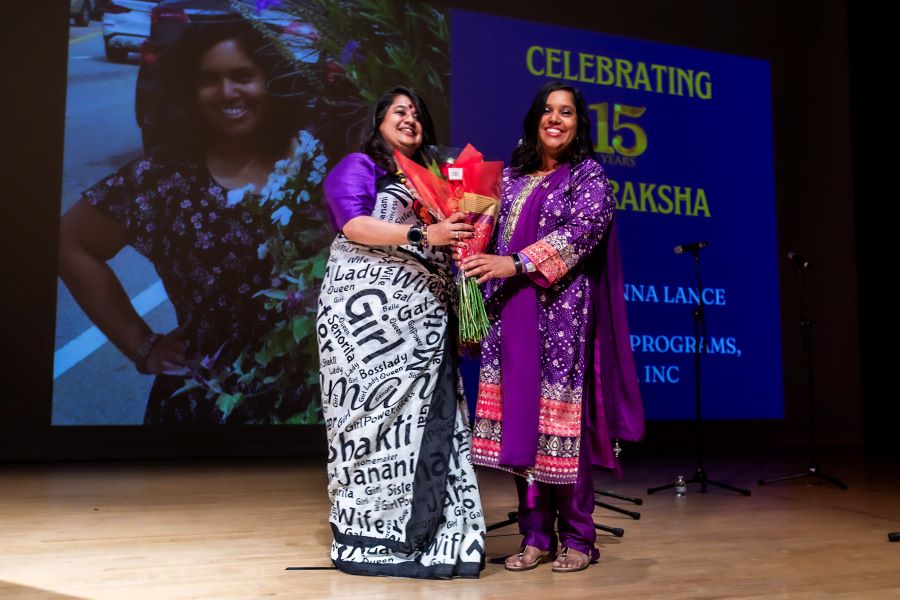
This year, the 25th anniversary of Ek Shaam came with bonus milestones – work anniversaries and a Presidential Award presented to Aparna for her exemplary service and to Nisha Kapil, Raksha’s Board President for her exemplary work with supporting the Raksha youth and their parents. In 2023, Raksha ED Aparna Bhattacharyya and Manisha Lance, Director Programs completed 25 years and 15 years, respectively with Raksha and were honored for their long-standing commitment and service.
“As Raksha celebrated the 25th anniversary of Ek Shaam events, one of the most positive aspects was that of community engagement. To see volunteers of all ages joining the effort, bringing their innovative ideas and dedicating their time to this highly anticipated annual fundraiser was indeed gratifying,” Nisha Kapil said.
“The 25th anniversary of Ek Shaam was simply an outstanding blend of the talented Penn Masala band, stories of survivors of women abuse and a great Master of Ceremony! Most gratifying were the Presidential Lifetime Awards presented to Aparna Bhattacharya and Nisha Kapil for their tireless service against domestic violence and abuse of women,” Dr. Jag Sheth who presented the award expressed.
In the heartwarming tradition of Ek Shaam, an evening known for its vibrant music and strong sense of community, Raksha took a moment to recognize and honor the remarkable strength and courage displayed by the survivors it serves. Two Raksha clients courageously took the stage to share their stories of resilience, leaving the event attendees deeply moved and inspired. Their stories sent a powerful message to the community to rally behind Raksha’s mission of assisting survivors on their transformative journey from silence to survival and ultimately, to thriving.
Emphasizing the need for a dedicated institution such as Raksha, survivor Ritu described ways in which the organization supported and advocated for her. “You (Raksha) provided support in many ways, from laptops, fellowships, scholarships, Metro tickets, Uber rides, even counseling and career guidance at the time… . Your compassionate colleagues were available on the phone to talk to me. Their informed, empathetic, liberal, skilled, steadfast and consistent support and optimism steered me towards life and positivity.” She appealed to the community to “create a community that is not only affluent and educated but also compassionate.”
“When I reached out to Raksha for help, I found a compassionate and understanding team of individuals who provided me with a lifeline. They offered a comprehensive range of services that addressed every aspect of my struggle. In the courtroom, they stood by my side, offering not just legal support but also the strength and encouragement I needed to face my abuser. Raksha didn’t just offer me safety. They made me feel truly seen and valued. Their tireless efforts led me to an exceptional immigration attorney, resulting in the attainment of my green card, an important milestone on my thoughts to safety and independence. Today, I proudly stand before you as a homeowner, a survivor, who has emerged from the shadows,” Survivor Arpita expressed. She urged the community to stand together and support the causes that Raksha serves.
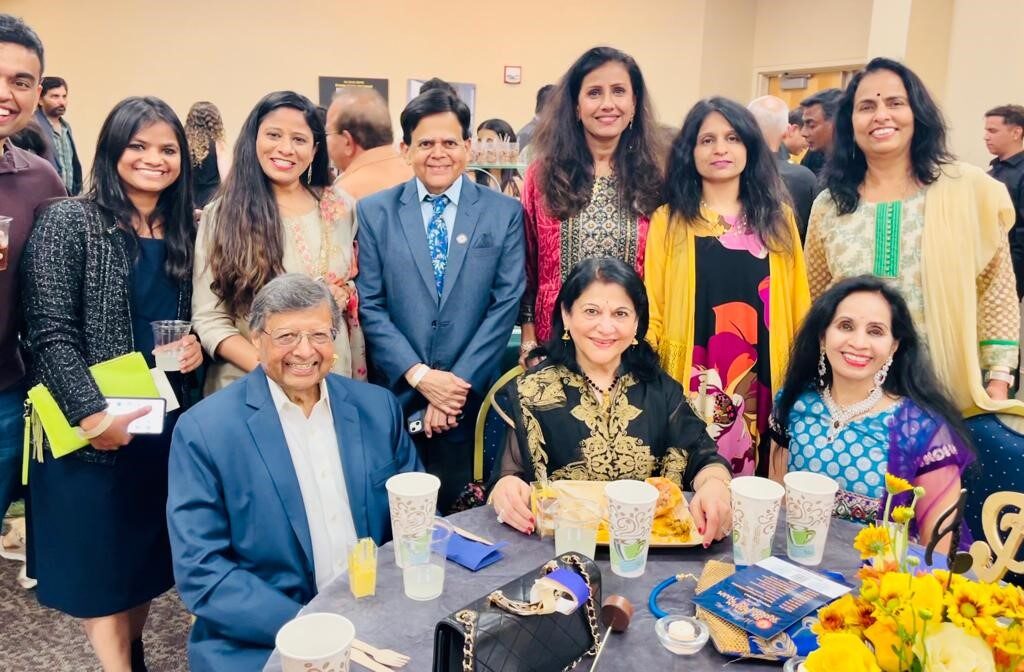
THE IMPACT:
The impact of Raksha, as expressed by the recipients of the awards and survivors is far-reaching and deeply involved – having a safe space where survivors will feel heard, be seen, and supported in making the choices that are good for their individual journey.
Raksha also engages in efforts to help talk about issues that the community does not often want to talk about or see. In talking about the issues and bringing them to light, it helps individuals experiencing abuse know they are not alone; it breaks their isolation and helps them have the courage to reach out for help or resources.
Their impact is reflected statewide in providing training that helps service providers understand the need for immigrant communities, language access, and being culturally responsive.
Raksha also has a nationwide impact by way of training and advocacy. They played a crucial role in helping ensure immigration relief was enacted and actualized for abused H4 abused spouses. During the pandemic, they worked with four individuals from three other organizations to create South Asian SOAR whose mission is to grow survivor and collective power to transform the culture and systems that lead to violence. [Link to the website: https://www.southasiansoar.org/purpose]
“The impact is different for each individual that comes to us; it can look like providing a child with tools for healing after witnessing or experiencing violence or tools to set one’s boundaries; it can be economic empowerment by means of helping start one’s own business or support for housing, or it could be a referral to legal help,” Bhattacharyya observed.
VICTIM ABUSE AND REPORTING OVER THE YEARS (SINCE THE PAST 28 YEARS)
Are victims more willing to report and come forward with their issues? “Yes and no,” Bhattacharyya says, adding that it really depends on the individual and the support system around them. “We might have survivors who have supportive families but have been socialized to believe that divorce is negative and might not feel comfortable seeking help. There are survivors who have supportive families that make it easier to leave, and we also have survivors whose family and friends are not supportive and discourage speaking out. Our community is bigger now, so we have more individuals seeking help. We are definitely at a place where more survivors are willing to speak about their experiences and are finding a supportive community.”
MAJOR DIFFERENCES IN COMMUNITY OUTLOOK OVER THE YEARS
“Raksha has been around 28 years, and in the beginning, many of our cultural and faith organizations did not want to talk about these issues at all,” notes Bhattacharyya. She reminisced the times when Raksha was often discouraged from holding workshops and seminars due to the fear of leaders in the community feeling this would reflect badly on the South Asian community. “We were told that these topics were too heavy and there was a fear we were wanting to break up families. Community acceptance of our work has grown but is still a challenge. There is often a challenge in that we are committed to supporting the entire community regardless of country, identity, or religion. This is a challenge we still face in getting community support across the South Asian community.”
Bhattacharyya also highlighted the ways in which technology advances both hinder and harm survivors coming forward. As technology has created unique ways to seek out support, she said, it has also created more ways to control and surveil survivors. “28 years ago, we were not as worked about devices that could track one’s travel, phone calls and communications as we currently have.”
28 years ago, she noted, it was easier for survivors to obtain affordable and safe housing while now many barriers make it difficult for survivors to be eligible for safe and affordable housing.
It was also easier for immigrant survivors to obtain affordable education because there were no state laws that limit immigrants from accessing the state university system. “We now have options for H4 survivors to get temporary immigration relief so they can support themselves. As an organization we have more resources to support survivors with their holistic needs. We did not have therapists on staff to help with healing, we did not have funds to help with rental assistance, and we did not have a food pantry. We have grown in our resources and partnerships. We currently have more community buy in which has helped us do more to meet the varying needs of survivors.”
While organizations such as Raksha strive towards healing, justice, and empowerment for survivors of violence, it is important for communities to band together to support the cause. Helen Keller said it best, “Alone, we can do so little; together, we can do so much.”





